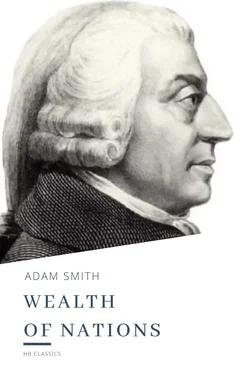This is all that I think necessary to be observed at present concerning the deviations, whether occasional or permanent, of the market price of commodities from the natural price.
The natural price itself varies with the natural rate of each of its component parts, of wages, profit, and rent; and in every society this rate varies according to their circumstances, according to their riches or poverty, their advancing, stationary, or declining condition. I shall, in the four following chapters, endeavour to explain, as fully and distinctly as I can, the causes of those different variations.
First, I shall endeavour to explain what are the circumstances which naturally determine the rate of wages, and in what manner those circumstances are affected by the riches or poverty, by the advancing, stationary, or declining state of the society.
Secondly, I shall endeavour to show what are the circumstances which naturally determine the rate of profit, and in what manner, too, those circumstances are affected by the like variations in the state of the society.
Though pecuniary wages and profit are very different in the different employments of labour and stock; yet a certain proportion seems commonly to take place between both the pecuniary wages in all the different employments of labour, and the pecuniary profits in all the different employments of stock. This proportion, it will appear hereafter, depends partly upon the nature of the different employments, and partly upon the different laws and policy of the society in which they are carried on. But though in many respects dependent upon the laws and policy, this proportion seems to be little affected by the riches or poverty of that society; by its advancing, stationary, or declining condition; but to remain the same or very nearly the same in all those different states. I shall, in the third place, endeavour to explain all the different circumstances which regulate this proportion.
In the fourth and last place, I shall endeavour to show what are the circumstances which regulate the rent of land, and which either raise or lower the real price of all the different substances which it produces.
Chapter 8 Of the Wages of Labour
The produce of labour constitutes the natural recompense or wages of labour.
In that original state of things, which precedes both the appropriation of land and the accumulation of stock, the whole produce of labour belongs to the labourer. He has neither landlord nor master to share with him.
Had this state continued, the wages of labour would have augmented with all those improvements in its productive powers to which the division of labour gives occasion. All things would gradually have become cheaper. They would have been produced by a smaller quantity of labour; and as the commodities produced by equal quantities of labour would naturally in this state of things be exchanged for one another, they would have been purchased likewise with the produce of a smaller quantity.
But though all things would have become cheaper in reality, in appearance many things might have become dearer than before, or have been exchanged for a greater quantity of other goods. Let us suppose, for example, that in the greater part of employments the productive powers of labour had been improved to ten fold, or that a day's labour could produce ten times the quantity of work which it had done originally; but that in a particular employment they had been improved, only to double, or that a day's labour could produce only twice the quantity of work which it had done before. In exchanging the produce of a day's labour in the greater part of employments for that of a day's labour in this particular one, ten times the original quantity of work in them would purchase only twice the original quantity in it. Any particular quantity in it, therefore, a pound weight, for example, would appear to be five times dearer than before. In reality, however, it would be twice as cheap. Though it required five times the quantity of other goods to purchase it, it would require only half the quantity of labour either to purchase or to produce it. The acquisition, therefore, would be twice as easy as before.
But this original state of things, in which the labourer enjoyed the whole produce of his own labour, could not last beyond the first introduction of the appropriation of land and the accumulation of stock. It was at an end, therefore, long before the most considerable improvemenlf till he reaps the harvest. His maintenance is generally advanced to him from the stock of a master, the farmer who employs him, and who would have no interest to employ him, unless he was to share in the produce of his labour, or unless his stock was to be replaced to him with a profit. This profit, makes a second deduction from the produce of the labour which is employed upon land.
The produce of almost all other labour is liable to the like deduction of profit. In all arts and manufactures the greater part of the workmen stand in need of a master to advance them the materials of their work, and their wages and maintenance till it be completed. He shares in the produce of their labour, or in the value which it adds to the materials upon which it is bestowed; and in this share consists his profit.
It sometimes happens, indeed, that a single independent workman has stock sufficient both to purchase the materials of his work, and to maintain himself till it be completed. He is both master and workman, and enjoys the whole produce of his own labour, or the whole value which it adds to the materials upon which it is bestowed. It includes what are usually two distinct revenues, belonging to two distinct persons, the profits of stock, and the wages of labour.
Such cases, however, are not very frequent, and in every part of Europe, twenty workmen serve under a master for one that is independent; and the wages of labour are everywhere understood to be, what they usually are, when the labourer is one person, and the owner of the stock which employs him another.
What are the common wages of labour, depends everywhere upon the contract usually made between those two parties, whose interests are by no means the same. The workmen desire to get as much, the masters to give as little as possible. The former are disposed to combine in order to raise, the latter in order to lower the wages of labour.
It is not, however, difficult to foresee which of the two parties must, upon all ordinary occasions, have the advantage in the dispute, and force the other into a compliance with their terms. The masters, being fewer in number, can combine much more easily; and the law, besides, authorizes, or at least does not prohibit their combinations, while it prohibits those of the workmen. We have no acts of parliament against combining to lower the price of work; but many against combining to raise it. In all such disputes the masters can hold out much longer. A landlord, a farmer, a master manufacturer, a merchant, though they did not employ a single workman, could generally live a year or two upon the stocks which they have already acquired. Many workmen could not subsist a week, few could subsist a month, and scarce any a year without employment. In the long run the workman may be as necessary to his master as his master is to him; but the necessity is not so immediate.
We rarely hear, it has been said, of the combinations of masters, though frequently of those of workmen. But whoever imagines, upon this account, that masters rarely combine, is as ignorant of the world as of the subject. Masters are always and everywhere in a sort of tacit, but constant and uniform combination, not to raise the wages of labour above their actual rate. To violate this combination is everywhere a most unpopular action, and a sort of reproach to a master among his neighbours and equals. We seldom, indeed, hear of this combination, because it is the usual, and one may say, the natural state of things, which nobody ever hears of. Masters, too, sometimes enter into particular combinations to sink the wages of labour even below this rate. These are always conducted with the utmost silence and secrecy, till the moment of execution, and when the workmen yield, as they sometimes do, without resistance, though severely felt by them, they are never heard of by other people. Such combinations, however, are frequently resisted by a contrary defensive combination of the workmen; who sometimes too, without any provocation of this kind, combine of their own accord to raise the price of their labour. Their usual pretences are, sometimes the high price of provisions; sometimes the great profit which their masters make by their work. But whether their combinations be offensive or defensive, they are always abundantly heard of. In order to bring the point to a speedy decision, they have always recourse to the loudest clamour, and sometimes to the most shocking violence and outrage. They are desperate, and act with the folly and extravagance of desperate men, who must either starve, or frighten their masters into an immediate compliance with their demands. The masters upon these occasions are just as clamorous upon the other side, and never cease to call aloud for the assistance of the civil magistrate, and the rigorous execution of those laws which have been enacted with so much severity against the combinations of servants, labourers, and journeymen. The workmen, accordingly, very seldom derive any advantage from the violence of those tumultuous combinations, which, partly from the interposition of the civil magistrate, partly from the necessity superior steadiness of the masters, partly from the necessity which the greater part of the workmen are under of submitting for the sake of present subsistence, generally end in nothing, but the punishment or ruin of the ringleaders.
Читать дальше












